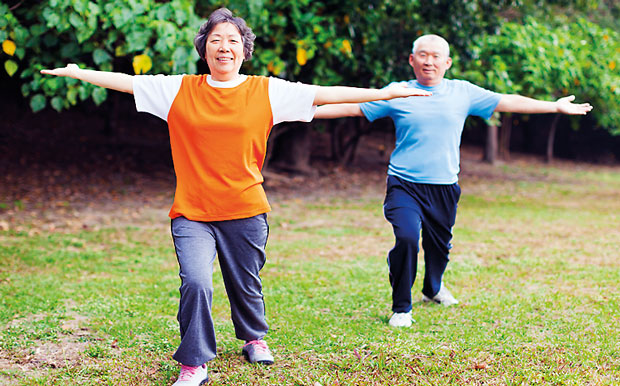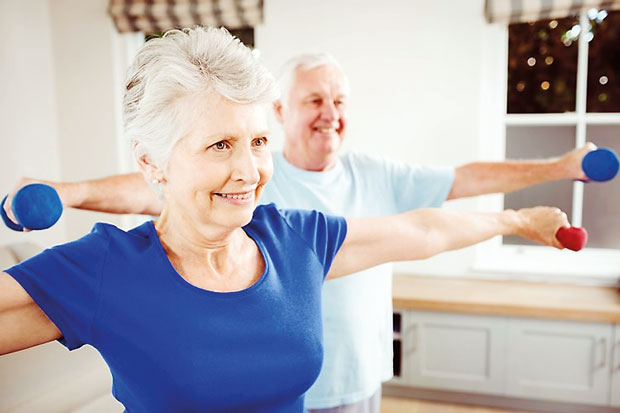23 Mar 2018 - {{hitsCtrl.values.hits}}

 1/3 rd of the above 60 population has experienced a fall during older age. While falls are more common among senior citizens, the consequences of falls are also quite severe when compared to the younger population. In today’s continuation of the last week’s article on falls among the elderly, we will discuss the consequences of falls and the actions that we could take to prevent them. Health Capsule consulted Dr. Dilhar Samaraweera, Consultant Physician of the Colombo South Teaching Hospital and Founder President of the Geriatric Association, Sri Lanka, to obtain information on the topic.
1/3 rd of the above 60 population has experienced a fall during older age. While falls are more common among senior citizens, the consequences of falls are also quite severe when compared to the younger population. In today’s continuation of the last week’s article on falls among the elderly, we will discuss the consequences of falls and the actions that we could take to prevent them. Health Capsule consulted Dr. Dilhar Samaraweera, Consultant Physician of the Colombo South Teaching Hospital and Founder President of the Geriatric Association, Sri Lanka, to obtain information on the topic.
The after-effects of a fall are not always physical, but can be psychological and social as well, especially in the elderly, according to Dr. Samaraweera.

Physical injuries can range from scraped knees to major trauma, commonly fractures. With their bones being already frail, hip fractures are a common occurrence, which cause the patient to be immobile for long periods of time due to the slow rate of healing. This would in turn give rise to other complications like bedsores and chest infections, the consequences of which can be devastating. In addition, vertebral fractures are also common, which causes the risk of damage to the spinal cord. Another serious trauma like bleeding into the brain can also be caused by falls, explained the doctor.
Falls can affect a person psychologically. They can make an individual lose confidence in his or her ability to walk steadily; one of the very basic functions in life. The fear of falling will force him to minimize his need for walking, restricting the person to be bed bound for longer periods of time. This may in turn lead to other problems like depression, constipation and urinary incompetence.
Falls have a negative social effect on the patients as well. The reluctance of the patient to step into the society for fear of falls would make him lose contact with his friends and family, causing him to feel cornered in the society. “In addition, this can be frustrating for the caregiver of the person as well. Falls are known to widen the gap between the patient and the caregiver, making the caregiver’s job more difficult,” remarked Dr. Samaraweera, concluding that falls could severely affect the quality of the life of an elderly person.
Preventing falls
We asked the doctor what steps could be taken by caregivers to prevent falls in the elderly population. According to him, there is much that can be done.
As we explained in last week’s article, falls could be caused due to factors relating to a patient’s physical and external environmental factors. While we can treat physical illnesses, a major part of preventing falls lie in modifying the environmental factors to suit the patient’s needs.
This doctor advises against the use of smooth, slippery tiles on the floor because it increases the risk of a person having a fall. He recommends mat tiles or cement on the floor instead. The use of loose carpets on the floor or on a staircase may also lead to slipping and falling. Caution should be taken against objects like toys lying around which contributes to stumbling and falling.
Minimal furnishing should be used in the person’s room/surroundings and there must be plenty of space for the individual to maneuver. Low-lying furniture like low chairs-which might cause falling (even when sitting down)-should be avoided. Instead use safer chairs with armrests. The bed should be situated neither too low nor too high from the ground.

Good lighting plays a major role in preventing falls. The light switch should be situated in a place where the person has easy access to; preferably near the bed. If there are steps or a staircase in the house, light needs to fall onto the steps in a way that the path is clearly visible. Too bright lights are best avoided, since the glare of the light may reduce visibility rather than improve it.
Toilets should be easily accessible to a person who is exposed to the risk of falling and the floor should always be kept dry. Grab bars could be installed in order to minimize the risk of falling while using the washroom. Low toilet seats, including squatting pans, are best to be avoided when catering to the needs of the elderly. The doctor explained that an improvised high seat can be used, in place of using a squatting pan.
A person at risk of falling should always wear steady, comfortable shoes which are neither too large, nor too small. The soles of the shoes should be resistant to slipping. Loose slippers should be avoided, according to Dr. Samaraweera.
Walking aids would prevent falls, but also could be a causative factor for falls themselves when they are not chosen correctly, cautioned the doctor. The ideal walking stick varies from patient to patient, depending on the person and the disability. He recommends taking the advice of a physiotherapist or an occupational therapist, before choosing a walking stick.
Elderly people who live alone and have no social support have a higher risk of falls, so help should be offered to them in a way that has a minimal affect on a person’s independence.
Message to caregivers
After a fall, it’s crucial to find out what caused the accident, in order to take measures to minimize a further occurrence. Much of the falls could be avoided by making the environment safer for the person, stressed Dr. Samaraweera. Also, counselling should be offered to a person who has experienced a fall beforehand and is afraid of falling again, in order to reassure them and assuage their worries.
Message to senior citizens
While falls and the consequences can be devastating, the risk of falls could be greatly minimized by leading a healthy lifestyle, according to Dr. Samaraweera. He advised the older generation to have a nutritious diet rich in protein and calcium as well as to exercise regularly, all of which contributes to an active life. Changes in the diet of course can be started at a young age. This process called ‘active healthy ageing’ would minimize the risk of falling as well as the consequences of a fall, concluded the doctor.
22 Dec 2024 8 hours ago
22 Dec 2024 8 hours ago
22 Dec 2024 22 Dec 2024
22 Dec 2024 22 Dec 2024
22 Dec 2024 22 Dec 2024